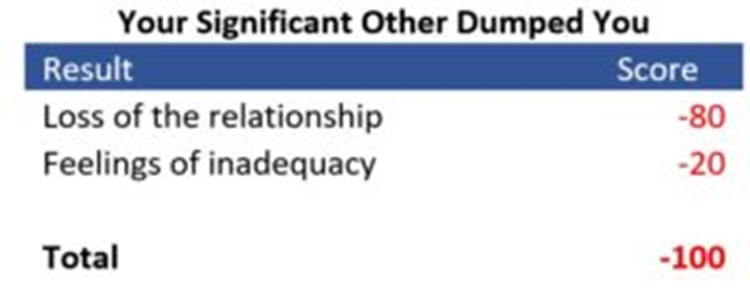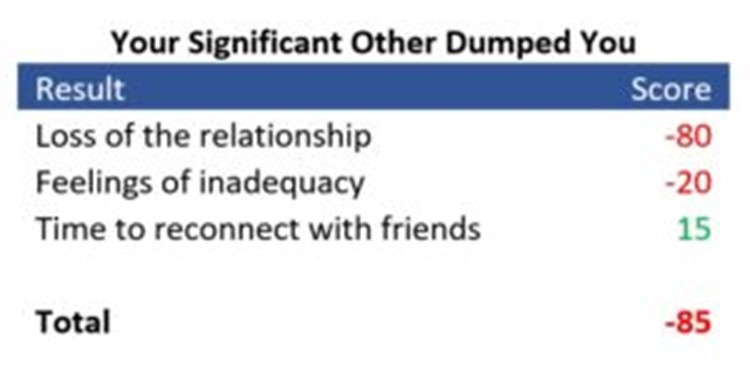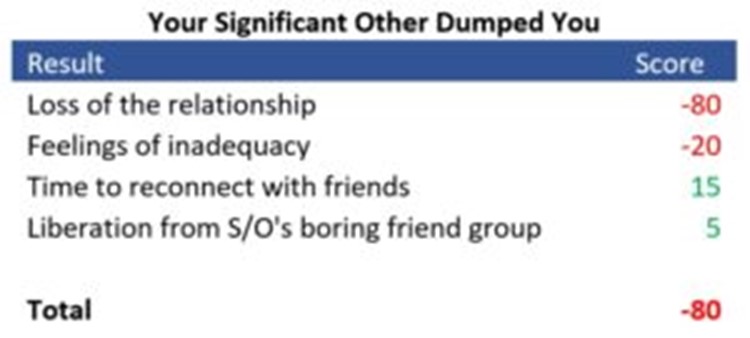If you’ve arrived at this article, it’s likely that you are on the receiving end of a breakup. So let me first start by saying I’m sorry.
Breakups can be an emotional gut punch. When I went through my first major breakup, I couldn’t eat or sleep properly for days. In fact, I couldn’t do much of anything. I felt helpless, and honestly, desperate to get back together. It’s a horrible feeling.
Given how terrible and debilitating a breakup can be, I thought it would be worth exploring how Stoicism, a philosophy focused on increasing joy, could help us get through such a tough experience.
Stoicism teaches us to use rational thinking, rather than emotions, to control our actions. As someone going through a breakup, you’re likely filled with a lot of negative emotions right now. It’s common to feel angry, hurt, confused, lonely, and even desperate. It’s normal to feel those things, and even the Stoics, especially Seneca, would expect you to feel that way.
Let not the eyes be dry when we have lost a friend, nor let them overflow. We may weep, but we must not wail. Seneca—(LXIII.1)
The important thing, however, is to not let those feelings cause you to act in a way you’ll regret later. Late-night, drunk texts to your significant other, desperate pleas to get back together, or a nasty attitude to your close friends won’t help you get over the breakup. They’ll just cause you to dig a deeper hole to climb out of later on.
First step: Remove your ex from your contacts
This may sound harsh, but, trust me, it will help a lot. We might not think about it too often, but we live in an age where possible to contact anyone immediately. So when you’re feeling upset, nervous, jealous, annoyed, or angry you can immediately send out text, or even worse, post about it on social media for the world to see. It gives your emotions the keys to the kingdom when it comes to your interactions with others.
That’s not normal. In recent history, if you were angry at someone, you couldn’t just immediately send them an angry text or ridiculous voicemail. You had to sit down and write a letter. And even after you wrote the letter, you probably had some time to rationally think about what you wrote before you sent it along to its destination.
So, let’s take the reins away from your emotional self by deleting your ex’s contact information from your phone. You’ll still be able to contact them if you need to by asking a friend, but at least there will be a giant barrier between emotional you and your means of communication with your ex.
If your ex contacts you, keep the interactions polite, but short. Don’t dramatically announce that you’re cutting them off. It’s okay though if they’re trying to contact you frequently to let them know you need your space. They may want to “stay friends,” but that’s probably not best for you! Keep it short and sweet and don’t proactively reach out for now unless necessary.
Second Step: Reduce Your Negative Emotions
Another way we can stop our emotions from running the show post-breakup is reducing their intensity in the first place. The less intense your emotions, the more likely “rational you” can steer the ship through these emotionally perilous waters.
When I was months deep into a breakup and still feeling down, I stumbled upon this New York Times article that suggested taking a Tylenol when a breakup has you feeling particularly bad. And you know what, it worked surprisingly well. Fewer bad nights meant more sleep. More sleep meant fewer negative emotions.
Obviously, don’t overdo it. And no, a pill won’t solve everything. But it can help.
Another way to feel better is to exercise. If you’re anything like me, you just rolled your eyes. We all know exercise stimulates positive emotions, but the last thing we want to do when we’re heartbroken is exercise, even if we know it will help.
I completely get it. If you feel like that, my suggestion is to schedule regular exercise sessions (runs, lifts, swims–what have you) with a friend. Since you’re scheduling exercise rather than immediately taking part in it, your brain won’t trot out its dumb reasons to prevent you from going. And when the time does come, the fear of breaking the social contract with your friend will probably outweigh how badly your brain doesn’t want to go in the moment.
Third Step: Find Any Positives in the Situation
“Think not so much of what you don’t have, but what you do have.” Marcus Aurelius—(Book VII)
When you’re feeling down, one of the most annoying things someone can do is to try to convince you the thing making you feel down is…drumroll…actually a good thing.
I’m not here to say that. Bad things do happen to people, and this breakup might be an overall bad event for you.
However, we often focus so heavily on a loss that we don’t appreciate anything that we’ve gained from a situation. Properly harnessing those gains can cause some positive momentum that helps us steadily recover from a loss.
Pros and Cons Table
When something bad happens to me, I like to make a grid to quantify the pros and cons of the situation. Say your significant other dumped you. We can give that a -100 on the emotional scale.

It is totally natural that you might be reflecting on the loss of the relationship and feelings of inadequacy that you’re having right now.
But what you’re probably not doing is sitting around trying to think of the positives your new circumstances could be adding to your life. Because it is not natural to think of these positives, we must do so intentionally. Otherwise, we might miss them all together.
For example, in this situation, you might have a lot more time on your hands. Maybe you can use that time to reconnect with your friends that you hadn’t seen as much during the relationship.
Now our table looks like this:


Or maybe you don’t have to hang out with your significant other’s friends anymore:


And so, you’ve moved from a -100 to a -80 on the happiness scale. No, the overall event is not necessarily a positive one. But the emotional difference between a -100 and a -80 could be what you need to get out of bed in the morning. And maybe, slowly, that leads to another small step, and another, and another, until you finally overcome the breakup. It all starts with intentionally trying to see the positives.
For me, I realized that without having to try to live in a place that worked for both my significant other and me, I could seriously pursue my dream career in a different location. And I did, which changed my life forever.
Step 4: Analyze the relationship
Once you’re feeling at least a little bit better, it’s time to think about the relationship honestly.
I’d suggest taking out your journal and answering three questions:
- What could I have done differently in the relationship?
- In what ways was my significant other not right for me?
- Five years from now, what will I think about this relationship?
Let’s look at the questions one by one.
What could I have done differently in the relationship?
As good Stoics, we know the only thing we can control is ourselves, so that’s why we start with you. It’s really tempting after a breakup to blame the other person. But almost every breakup is a two-way street. When I examined my own relationship after a breakup, I realized I’d started to be controlling and depend on the relationship so much that I was getting clingy. In my next relationship, I made sure to maintain healthy relationships, hobbies, and goals outside the relationship, and it’s been extremely beneficial for both me and my wife.
So reflecting on this relationship, what’s something you wish you could’ve done better?
That’s not to say the breakup isn’t your ex’s fault. Maybe they cheated, started doing drugs, or ended up being a bad person in general. That’s not on you. But were there any warning signs throughout the relationship that you ignored? Did you give them too many chances? It’s okay if, after proper reflection, you don’t think there’s anything you could’ve done differently, but it’s important to conduct an honest assessment of your actions.
In what ways was my significant other not right for me?
If you’re anything like me, you might be completely desperate to get back with your significant other right now. In that situation, it’s easy to put them, and your relationship in general, on a pedestal. No person or relationship is perfect, however, so try listing out some ways that your ex was not right for you. The goal here is to bring your emotional desire to get back together up against some rational thinking. Was this person even right for you? Were you happy in the relationship day to day? Were there any long-term logistical issues that may have prevented the relationship from succeeding?
Seriously think about it. You’re in a lot of pain right now and are already halfway to being free from it. Is this relationship something you’d want to jump back into, or, in your heart, do you know it’s better to move on to something that might be a better fit?
Five years from now, what will I think about this relationship?
The goal of this question is to try to create some emotional distance between you and the pain of here and now. Think of something that you wish went differently about five years ago in your life. How do you feel about it now? Do you still think about it constantly? Or have you come to peace with it?
Now try to picture your older, wiser self five years from now. Do you think that wiser you will still be thinking constantly about how this was the “one” that got away? Or do you think you’ll probably be thinking “Phew, I dodged a bullet.” Just like that event from five years prior that you may have moved on from already, I imagine this breakup might feel the same way when you really reflect on it. But maybe not, and that indicates that this person may be the right person for you and it’s worth having a discussion with them in the future about getting back together.
Conclusion
Either way, don’t beat yourself up about the things that could’ve gone differently. It’s tempting to think if only someone had told me this, the relationship could’ve succeeded. Or if only I had done that, we’d still be together.
Unfortunately, that’s not always how life works. Through our experiences, especially negative ones, we gain wisdom. Wishing that you were more prepared for this past relationship is like wanting to become a great basketball player and lamenting playing poorly in your very first game. Failing is just the first step of learning. Regardless of how this relationship ultimately turns out, I hope you can at least use it as a lesson to build an even better relationship in the future. Just as Seneca taught us:
“No prizefighter can go with high spirits into the fight if he has never been beaten black and blue.” – Seneca (XIII.2)
So after reflection, go forward knowing that you understand relationships better, what works best for you, and how you can be a better partner. Wishing you all the success on the road ahead!



